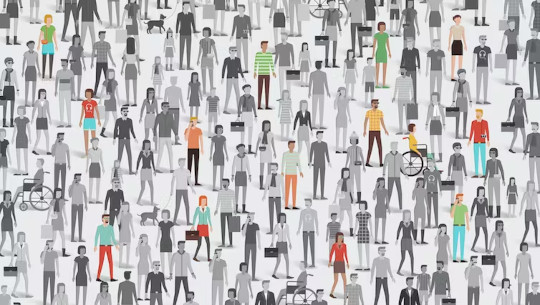
Common sense is broadly defined as a shared set of beliefs and approaches to thinking about the world. elenabsl/Shutterstock
Politicians love to talk about the benefits of “common sense” – often by pitting it against the words of “experts and elites”. But what is common sense? Why do politicians love it so much? And is there any evidence that it ever trumps expertise? Psychology provides a clue.
We often view common sense as an authority of collective knowledge that is universal and constant, unlike expertise. By appealing to the common sense of your listeners, you therefore end up on their side, and squarely against the side of the “experts”. But this argument, like an old sock, is full of holes.
Experts have gained knowledge and experience in a given speciality. In which case politicians are experts as well. This means a false dichotomy is created between the “them” (let’s say scientific experts) and “us” (non-expert mouthpieces of the people).
Common sense is broadly defined in research as a shared set of beliefs and approaches to thinking about the world. For example, common sense is often used to justify that what we believe is right or wrong, without coming up with evidence.
But common sense isn’t independent of scientific and technological discoveries. Common sense versus scientific beliefs is therefore also a false dichotomy. Our “common” beliefs are informed by, and inform, scientific and technology discoveries.
Take for example “the unconscious”. Regardless of who we attribute this concept to, be it Sigmund Freud, Pierre Janet or Gottfried Leibniz, the unconscious is a psychological idea that has entered into our collective understanding of how the mind works. It is self-evident that we have one. But we didn’t learn about this concept independently of science, medicine and philosophy.
The concept of the unconscious and its associated phenomena (such as implicit bias or microaggressions) has a long history of valid scientific challenge. But it gains authority in our everyday commonsensical beliefs of the mind because we can apply it to so many situations. We use it, rightly or wrongly, to attribute responsibility for actions that seem hard to explain – even blaming unlawful actions on processes outside of our conscious control.
The idea that common sense is universal and self-evident because it reflects the collective wisdom of experience – and so can be contrasted with scientific discoveries that are constantly changing and updated – is also false. And the same goes for the argument that non-experts tend to view the world the same way through shared beliefs, while scientists never seem to agree on anything.
Just as scientific discoveries change, common sense beliefs change over time and across cultures. They can also be contradictory: we are told “quit while you are ahead” but also “winners never quit”, and “better safe than sorry” but “nothing ventured nothing gained”.
Common sense in psychology
For a long time, psychology was criticised for being a trivial and low discipline – the science of common sense – which didn’t help its standing relative to the natural sciences. But is it? It’s a question the psychologist John Houston set out to investigate in the 1980s.
Houston presented two different groups of non-experts in psychology with a series of multiple choice questions about standard discoveries in psychology. One group comprised first-year undergraduate students who had just started their introductory course in psychology, and the other group included members of the public.
Both groups successfully picked the right responses well above chance. The conclusions drawn from the study were that psychological research is simply conducting experiments that are mostly fruitless. Why bother running experiments to make discoveries that are self-evident to anyone relying on common sense?
But this isn’t a valid rebuke of the value of psychological research. Take for example the common sense, self-evident view that the more manipulated we are by others, the less free choice we have. My colleague and I have been looking into this common sense view, but can’t find stong support that this is true even after ten studies with over 2,400 participants and 14,000 data points.
This shows it is worth exploring ideas that may seem self-evident. We can never know until we run a study (unless it is rigged) that we will observe what we expect. And even if it is self-evident, scientific expertise and experimental methods help explain why some observations seem obvious. We use science to group the observations into a classification system from which further generalisations and predictions can be made. None of this can be achieved through common sense alone.
Benefits and costs of the collective
That said, common sense claims and beliefs can be useful. They are often a starting point for scientific investigations and hypotheses.
Also, there are situations, dubbed “wisdom of crowds”, where collective thinking is better than that of most individuals in a group. This is what happens when the the studio audience are polled in the “Ask the Audience” element of the show “Who Wants to be a Millionaire”. In many instances, relying on the audience is the better option than going against them.
But wisdom like this only works if the crowd aren’t influenced by each other’s opinion, which can be hard to achieve in everyday life. And the wisdom of crowds can be improved by being selective and relying on the collective view of the wisest group members only. Crowd-sourced wisdom also fails when the members are part of an echo chamber or if it leads to mob rule.
Why politicians love it
So why do politicians love talking about common sense so much? To me it seems like a convenient way to shut off doubts and questions. And this is where things get dangerous.
The greater the attempts to prohibit questions around a claim by appealing to common sense, the more suspicious we should all be about the claim itself. Shutting down any ability to expose a claim to scrutiny means that it is being protected from reason.
When we ask questions we have the ability to challenge as well understand. This is necessary. If we can’t ask, we can’t learn and if we can’t learn, we can’t improve. That goes for individuals as much as society as a whole.![]()
About The Author
Magda Osman, Principal Research Associate in Basic and Applied Decision Making, Cambridge Judge Business School
This article is republished from The Conversation under a Creative Commons license. Read the original article.

Related Books:
On Tyranny: Twenty Lessons from the Twentieth Century
by Timothy Snyder
This book offers lessons from history for preserving and defending democracy, including the importance of institutions, the role of individual citizens, and the dangers of authoritarianism.
Click for more info or to order
Our Time Is Now: Power, Purpose, and the Fight for a Fair America
by Stacey Abrams
The author, a politician and activist, shares her vision for a more inclusive and just democracy and offers practical strategies for political engagement and voter mobilization.
Click for more info or to order
How Democracies Die
by Steven Levitsky and Daniel Ziblatt
This book examines the warning signs and causes of democratic breakdown, drawing on case studies from around the world to offer insights into how to safeguard democracy.
Click for more info or to order
The People, No: A Brief History of Anti-Populism
by Thomas Frank
The author offers a history of populist movements in the United States and critiques the "anti-populist" ideology that he argues has stifled democratic reform and progress.
Click for more info or to order
Democracy in One Book or Less: How It Works, Why It Doesn't, and Why Fixing It Is Easier Than You Think
by David Litt
This book offers an overview of democracy, including its strengths and weaknesses, and proposes reforms to make the system more responsive and accountable.






















